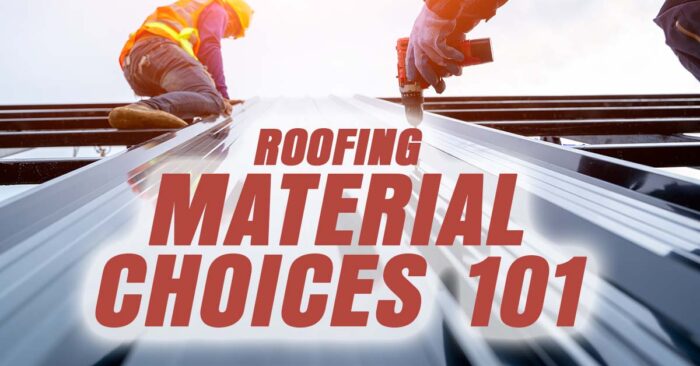Roofing Material Choices 101

Roofing Material Choices 101
Depending on the type of roof you currently have and the climate where you live, roofs can last from 15 to 75 years. They will also vary widely in price range and as usual, you often get what you pay for. If you are in the market for a new roof, there are some choices you should be aware of.
The most significant choice you will make will likely be the material your new roof will be made of. Here’s a quick look at popular options.
Asphalt Composite Shingles
This is one of the most affordable and popular roofing materials used in the United States today. It also has the shortest lifespan. Asphalt composite shingles are flexible, easy to install and come in a variety of colors and shades.
Wooden Shakes or Shingles
Wooden shakes or shingles not only offer a higher level of durability and strength, many consider them a more attractive option than the less expensive asphalt composite shingles. There’s a classic look and appeal to wooden shake roofs that make them popular for many planned communities.
Slate Shingles
Slate shingles have been used for generations and have been popular in the construction of church roofs that tend to be steeper. When properly installed, slate shingle roofs can last for 50-75 years or more.
Clay and Concrete Tile
Popular in Spanish style homes, clay and concrete tile roofs are durable and heavy, and hold up well in high winds. Because of their weight, upgrading to a clay or concrete tile roof may involve strengthening the roof trusses and foundation. These too, have extended lifespans that can reach to 50 years or longer.
Metal Roofing
Once popular only on farm buildings, metal roofs have advanced to become much more friendly for personal residences. They are more attractive, maintenance free and quieter than metal roofs of the past and offer a longer lifespan than asphalt. They are also significantly more expensive than asphalt, but less so than slate, clay or wooden shake roofs.
Solar Roofing
New and exciting solar roofing panels are being developed that not only serve as a roofing material, but can power the home. These options are exceptionally expensive for now, and are still mainly in the developmental stage, but are worth keeping an eye on.
Next to your roof, your homeowners’ insurance is the most important way to protect your home. We can help you compare coverage and rates. Contact one of our independent agents for a home insurance price quote today.
Do you have questions about your insurance? Find an insurance agent near you with our Agent Finder
Search All Blogs
Search All Blogs
Read More Blogs
Let the Good Times Roll—Safely: Mardi Gras Liability for Your Business
Hosting a Mardi Gras party this Tuesday? Make sure your business has the right event liability and liquor coverage before the beads start flying.
The Business “Prenup”: Why Business Partners Need Life Insurance in February
Love your business partner? Protect your company with a Life Insurance-funded Buy-Sell agreement to ensure the business survives the unexpected.
Heading South? Insuring Your Mid-Winter Break Road Trip in February
Driving to find some sun this week? Check your roadside assistance and rental car coverage before you leave the driveway.
Spring Dreams, Winter Schemes: Updating Your Insurance Before Your Spring Renovation
Planning a Spring kitchen remodel? Learn why you need to call your insurance agent before the contractors arrive to ensure your project is covered.
Shadow or Spring? The Quirky Science and Folklore of Groundhog Day 2026
Will he see his shadow? Dive into the history and humor of Groundhog Day 2026 and why we still trust a rodent with our weather forecasts.
Stocked for Love: Protecting High-Value Valentine’s Inventory with Business Insurance
Is your Valentine’s stock protected? Ensure your business insurance accounts for the massive inventory surge happening in early February.
New Life, New Responsibility: Why a February Arrival Means Updating Your Policy
Welcoming a new family member this February? It’s time to move life insurance to the top of your to-do list to ensure your child’s future is secure.
Delivering Love: The Insurance Risks of Valentine’s Week Gig Work
Delivering flowers or chocolates for extra cash this Valentine’s? Make sure your car is actually insured for delivery work before you hit the road.
Tax Prep & Protection: Ensuring Your Home Office is Fully Insured for 2026
Prepping your taxes? Don’t forget to check your home office insurance. Your standard policy might not cover your professional gear or liability.
More Than Just a Sale: The Fascinating Evolution of Presidents’ Day
Why is Presidents’ Day on a Monday? Explore the history, the politics, and the trivia behind our mid-February celebration of national leadership.









